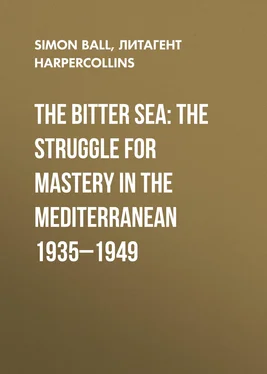A final flaw of Alexandria was created by its position on the Nile Delta. The outpouring of the Nile created complex eddies, currents and water densities. By developing a method–called sonar–of ‘pinging’ artificial bodies underwater with sound waves, and picking up the echo, the British possessed what they hoped was the decisive weapon against submarines. The hydrology of Alexandria, however, crippled this brilliant new British invention. 66 Alexandria was the perfect laboratory for mezzi insidiosi. Italian submarines operated at the harbour mouth, shadowing British battleships whenever they left port. 67

In the event, however, Italian submariners demonstrated the value of mezzi insidiosi elsewhere in the Mediterranean. In August 1937 Mussolini and Ciano ordered them to launch a ‘pirate war’ in the Mediterranean against Spanish and Soviet shipping. 68 In Rome, they would maintain ‘plausible deniability’. Merchantmen would be sent to the bottom by desperadoes of unknown origin. Fifty-nine submarines fanned out through the Mediterranean. Some daring submariners made it as far as the Black Sea Straits where they attacked Soviet ships, proving that the Turks could not defend the Straits they had, with such fanfare, remilitarized. Cruisers and destroyers entered the Straits of Sicily, the choke point between eastern and western Mediterranean, attacking any Spanish ship that passed. Torpedo boats ranged along the North African coast doing the same. 69 The operation also was not without its risks. At the end of August the submarine Iride attacked the Royal Navy ship HMS Havock in error. Up until that point British destroyer crews had largely enjoyed their posting in the western Mediterranean. Memorably, Miss Czechoslovakia had embarked on a warship during a stop-over at Palma by the First Destroyer Flotilla. The beauty queen had ‘enjoyed her passage enormously and even joined us in the water when we stopped and piped hands to bathe’. 70 The contrast with a sudden attack was a shock. The enraged destroyer captain hunted the submarine for hours, although in the end neither vessel was sunk. Even Ciano admitted, we are in deep trouble’. 71
The foreign ministers of the ‘Mediterranean powers’ assembled in the Swiss town of Nyon to discuss what should be done about the ‘piracy’. 72 Nyon was an appeasers’ paradise. The fiction that attacks on merchant shipping in the Mediterranean was the fault of ‘pirates unknown’ was fully indulged. Italy was even invited to the meeting, although it declined to attend. Not one word of criticism of Mussolini was allowed to emerge. The Mediterranean powers agreed to set up anti-submarine patrols. Italy was invited to take part in these patrols, in effect allowing her destroyers to search for her own submarines. The Royal Navy accorded the Regia Marina equality of status in the Mediterranean. 73 Nyon was hailed as a triumph of ‘collective security’. England: ‘a nation which thinks with its arse’, was Mussolini’s rather more robust verdict. ‘It is a great victory,’ chuckled Ciano, who only a fortnight before had been scared by the thought of British action, ‘from accused torpedoers to Mediterranean policemen, with the exclusion of the Russians, whose ships have been sunk.’ 74 Nyon preserved the naval status quo in the Mediterranean until the end of the Spanish Civil War: the Francoists received whatever they wanted, the Republicans got very little. 75

Mezzi insidiosi rested on a clear understanding of the psychological weakness of enemies. Mussolini could look deep inside the British military, political and diplomatic establishment. The Italians had an outstanding intelligence network that fed Mussolini timely and accurate accounts of British deliberations about the Mediterranean. Mussolini often dressed up the sources of his information in picaresque stories; he ascribed his–accurate–information about ammunition shortages of the Royal Navy in the Mediterranean to a letter from ‘a lady’ in London. 76 In fact the intelligence-gathering was not fortuitous but the result of a professional and systematic effort. In 1924 Italian military intelligence–SIM–had introduced its first mole into the British Embassy in Rome. The treacherous Embassy servant was, in due course, succeeded by his brother, who kept Mussolini supplied with British diplomatic correspondence until Italy entered the Second World War in June 1940. 77 At the post-war trial of the head of SIM, General Mario Roatta, it was claimed that his agency removed 16,000 documents a year from embassies in Rome. They also ran operations in other capitals. Italian employees of the Marconi company in Egypt, for instance, copied sensitive telegrams and fed them to Italian intelligence. 78 When Galeazzo Ciano met Hitler on 24 October 1936 he was able to hand him a dossier of thirty-two British Foreign Office documents. ‘Today,’ Ciano recorded the Führer as saying, ‘England is governed merely by incompetents.’ 79
Hitler had a point: the damage caused by Italian espionage went far beyond diplomatic documents, however revealing of national policy. The haul from the British Embassy in Rome included diplomatic and consular codes, the naval attaché cipher, the India cipher and the interdepartmental cipher. Even without these windfalls the Italian cryptanalysts found communications between London and Athens, Belgrade, Rome and Addis Ababa easy to break. SIM could read British, French and Ethiopian diplomatic traffic. Naval codebreakers had similar successes. From the summer of 1935 they were reading signals from the Admiralty to Royal Navy units in the Mediterranean and the Red Sea. 80 The decrypts often reached Mussolini’s desk within twenty-four hours of interception. Ignorant of how compromised they were, even the British recognized that Mussolini knew a great deal about their military plans and dispositions, ‘for’, Sir Robert Vansittart, the professional head of the Foreign Office, conceded, ‘they have a decent Intelligence service.’ 81

In October 1937 another famous novelist paid tribute to the impact of mezzi insidiosi on the English imagination. ‘The best of the new autumn crop’ of thrillers was Agatha Christie’s Death on the Nile. It told a story of theft and murder in Egypt, unravelled by Christie’s Cartesian alter ego, the mincing Belgian, Hercule Poirot. Death on the Nile proved an entertainment of such enduring charm that few noticed how timely was the central plot. A group of western tourists escape the cold of the western Mediterranean for Egypt, ‘real warmth, darling. Lazy golden sounds. The Nile.’ On board the steamer Karnak, Poirot encounters two characters whose politics intrude into the murderous private affairs of their fellow passengers. His old friend Colonel Race, ‘a man of unadvertised comings and goings…usually to be found in one of the outposts of empire where trouble was brewing’, was on the trail of those who sought to undermine British power. There had been ‘a good deal of trouble out here’. But it was not, the Colonel revealed, ‘the people who ostensibly led the rioters we’re after’. Race’s prey were the men who ‘very cleverly put the match to the gunpowder’. He was seeking one of the ‘cleverest paid agitators that ever existed…a man with five or six cold-blooded murders to his credit...bit of a mongrel’. That clever, murdering, mongrel turned out to be an Italian fellow passenger. There was something not right about Signor Guido Richetti, Archeologo. He used ‘hair lotions of a highly scented kind’ and carried a lady’s gun, the ‘Mauser automatic twenty-five’. 1 Most damning was the discovery of Richetti’s telegraphed instructions from the Italian secret service in Rome. Once their code had been broken, it revealed that an innocent discussion of vegetables was something much more sinister, a plan for violent revolution, for ‘potatoes mean machine guns and artichokes are high explosives’.
Читать дальше














